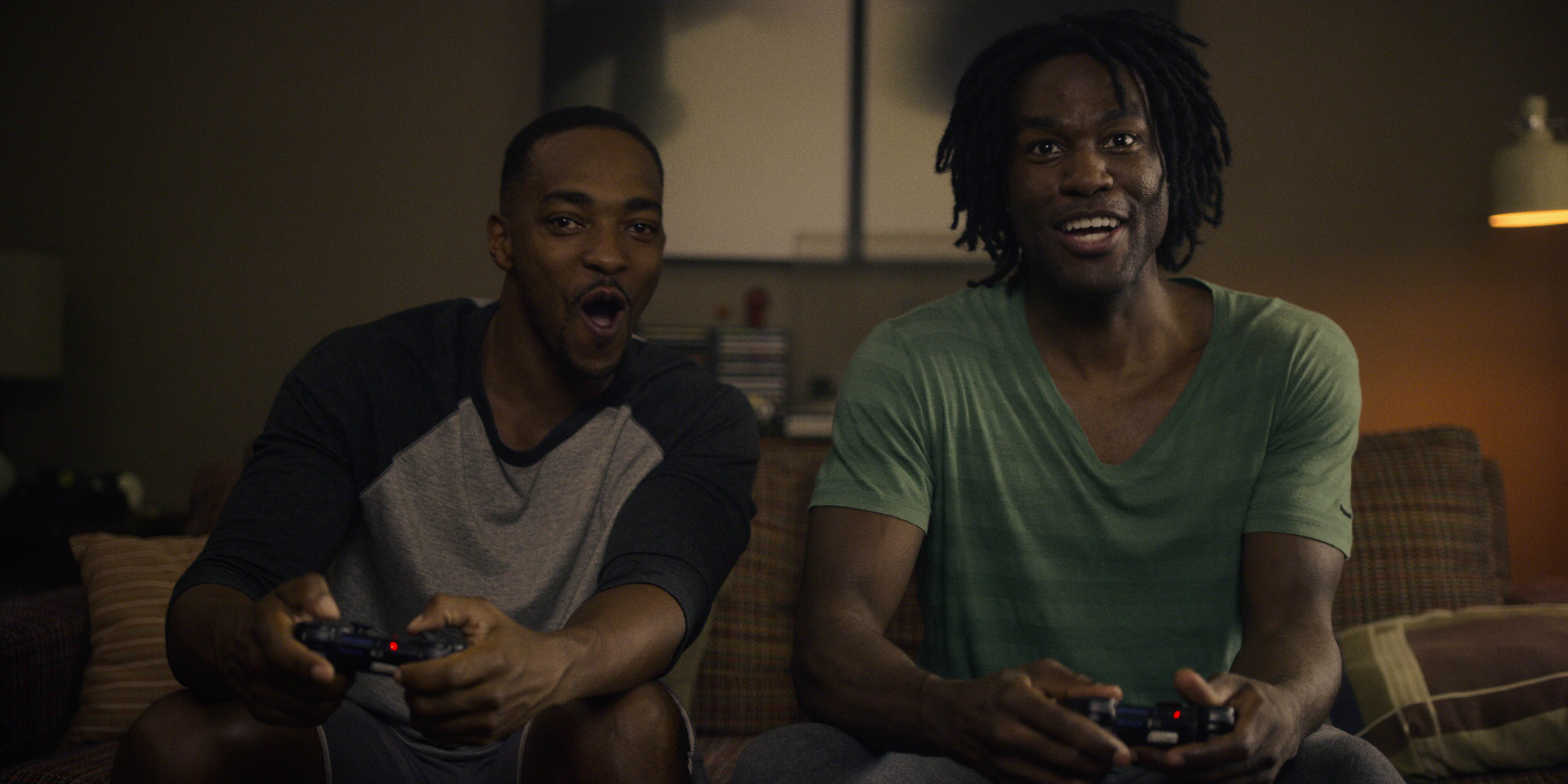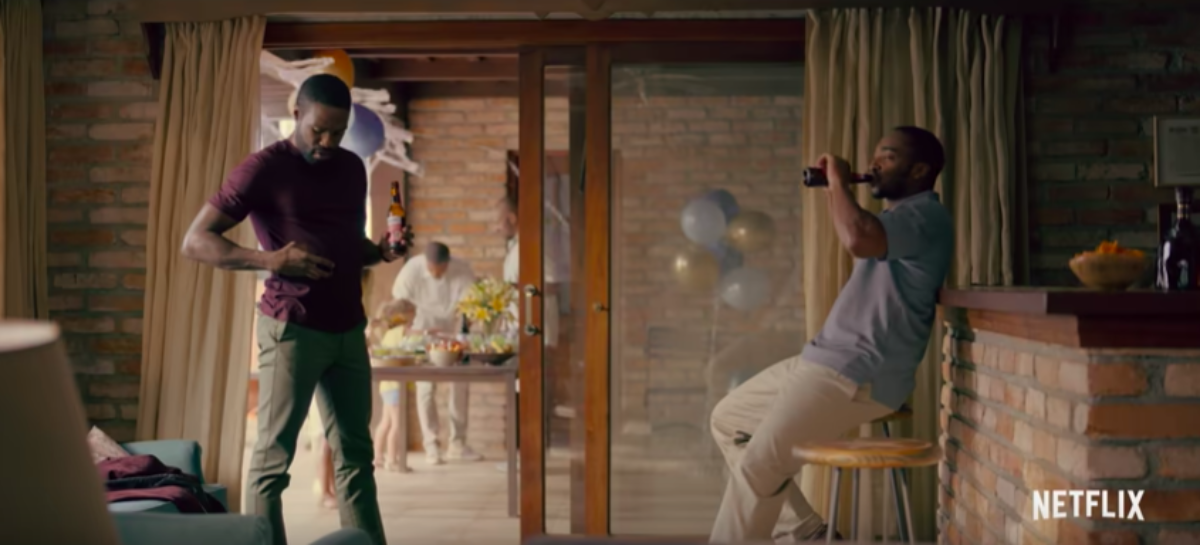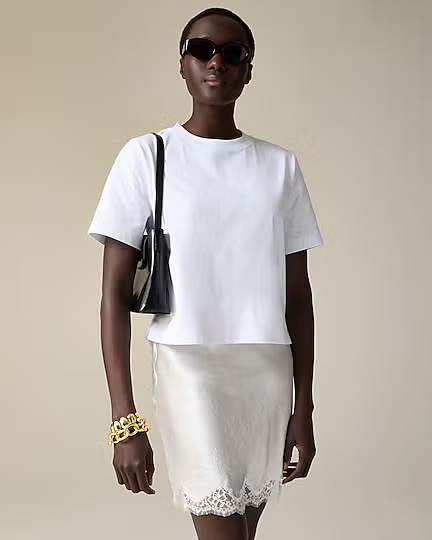He knew that his Black Mirror episode “would be a hot conversation piece.” Since it premiered last week, Yahya Abdul-Mateen II’s turn in the popular Neflix series’ “Striking Vipers” episode has been the subject of theory debates, memes and lots of discussion about polar bears. (No, they’re not going extinct.)
In the Charlie Brooker-penned episode, Abdul-Mateen and Anthony Mackie portray two college besties, who reunite when they’re washed. Growing bored from their everyday lives, with Abdul-Mateen’s Karl living his best life as a bachelor while Mackie’s Danny is a husband and father (actively working on child No. 2), the two reconnect years later by playing one of their favorite past times, video games. But this isn’t Sega Genesis. Instead, this virtual reality game has the two exploring their friendship and sexuality more than they’d ever realize.
And while many are focusing on how two Black men explored the nuances of sexuality onscreen, during Pride Month no less, Abdul-Mateen told ESSENCE last Friday his character was moreso drawn to his best friend sexually in a virtual reality game because he was “desperate for a connection.”
“He felt something. He felt understood and he felt seen by Danny inside of the video game in a way that he hadn’t felt seen by anyone before,” he continued. “It was the idea of being seen by a partner that turned him on so much. That must have felt like love for Karl.”
ESSENCE spoke to Abdul-Mateen about more of our theories from Black Mirror‘s “Striking Vipers” episode, which also stars Sleepy Hollow’s Nicole Beharie. He also weighed in on the recent viral conversation sparked by Pose star Billy Porter about the “enraging” double standard in Hollywood of straight actors portraying gay characters (well, is his character really gay? We’ll never know!), and the push for more inclusion.
ESSENCE: When you first read the script, what did you think?
Yahya Abdul-Mateen II: Black Mirror is a show that I love. It has high taste and there’s always some unexpected twists and turns dealing with how we interact with technology, and so I thought it was awesome. I didn’t know what was going to come of it, but I said, ‘Oh, this is definitely an exciting world to [play in].’ It was exciting. I thought it was funny. I thought it was well written.
We had so many debates on all of the theories from the episode and what they meant; what they didn’t mean. What do you think this episode was trying to say, or trying to teach us, about sexuality and virtual reality?
The episode was designed to open up those conversations, right? This one definitely did speak to technology as escapism. And to say, ‘Well, what can happen when we escape into an alternate universe? Are the rules still the same? Also, what are the rules about how we express our needs and our desires?’ In terms of sexuality, in terms of relationships, in terms of friendships, in terms of connection, I think this episode was investigating what the rules are and how we go about defining those rules.
Since you were embodying Karl, do you think the two always had feelings for each other or not? Because I don’t think they did, but one of my colleagues—
You don’t think they did?

No I don’t, but my colleague was like, ‘Well, he was kind of humping him on the couch,’ and I was like, ‘Well that kind of seemed like what frat boys do.’ What’s your take on that?
No, from Karl’s perspective. It’s important to state that who Karl presents himself to be is not actually who he is. Karl is a person who is lonely. Beneath anything else, Karl has a loneliness. And Danny is also someone who has lost some excitement in his marriage. [He and his wife] are not going out to the club and role playing anymore. They’re at home, living the suburban life, trying to raise a kid, talking about stuff like the dishwasher and making chili. So they’re both two people who are looking for some type of spark and some type of excitement, and then Karl shows up with this video game that they used to play, and they step into that with the expectation like, ‘Oh, this is going to be just like old times when we were just out of college and carefree.’ But I wouldn’t say that in Karl’s mind that he went into it with any sort of ulterior motive.
So we agree. Great, wonderful. I knew I was right! I knew it!
That’s not definitive. You’ve got to remember: that’s from Karl’s perspective.
But if you’re saying it—since you’re the actor playing Karl—I feel like I have a leg up so when I go back on Monday, I’m going to be like, ‘I told you!’ One of the other really powerful things about this episode in particular is that its cast is 100% people of color. Was that meaningful for you too?
We sort of knew and we wanted it to be authentic. We wanted it to be something that would resonate here in the States, and I knew that I wanted Black people to be able to talk about it…so I was very excited to be a part of something that would raise all of these conversations into a Black space. Because they’re important conversations to have. Ultimately, we’re talking about sexuality, but we’re also talking about connection and friendship and intimacy and masculinity and infidelity and secrets. It’s…awesome to bring that to our culture.

Did the episode teach you about sexuality at all?
It definitely taught me to reflect on the importance of asking questions about your sexuality, asking questions about yourself. They were exploring sexuality…from the perspective of having a need that could only be met through another person. This episode was reminding us that the need is going to change, and it’s not always going to look the same. And sometimes it’s going to be sexual in nature, and other times it’s going to be the desire just to be close, and the desire to touch, or the desire to lay close to a partner and to have a conversation. More than anything, it continues to reinforce the idea that connection is important no matter if we’re talking about sexual orientation or if we’re talking about marriages or friendships—and there’s a lot more fluidity to friendships.






There is a sort of a larger debate about—and I think it’s debatable whether Karl and Danny would consider themselves gay. I don’t think that they would—but there is a sort of larger debate in Hollywood about having straight actors play gay characters. Especially since this episode debuted during Pride Month, where do you see this debate going as Hollywood becomes more inclusive as far as casting?
Anything that we do to [uplift] the conversation in terms of making sure that actors from the LGBT community feel included and are represented on our screens…it’s a great cause. One thing that we don’t see often is Black men onscreen dealing with the question of sexuality from a non-judgmental perspective. That moment when they decided to step into the parking lot to figure out what the hell was going on between them, we saw two mature men step up to the line to figure out what was going on. And they didn’t do it with any harsh judgment. They were actually open to figuring out what actually was there. That’s important to show onscreen, to show two Black dudes who…have a vessel to explore their sexuality and to understand who they are. That’s one of the things that I’m glad that the episode did offer in the end.
This interview has been edited for clarity.




